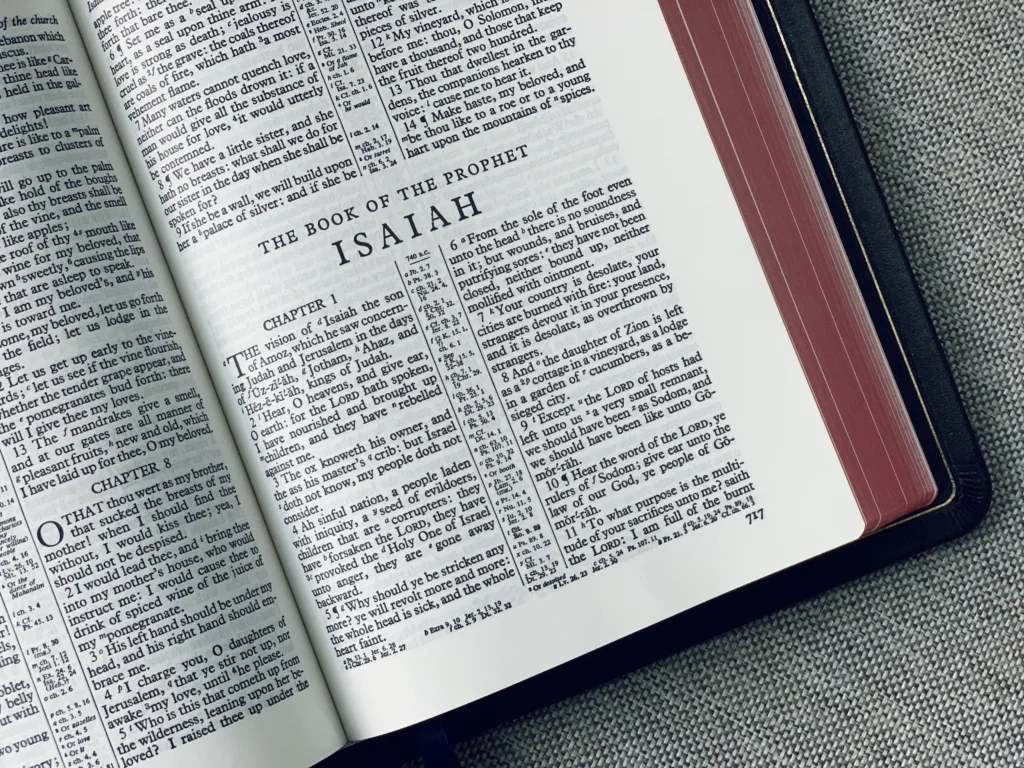Isaiah, one of the most prominent prophets in the Bible, lived during a significant period in ancient history. Scholars estimate that Isaiah lived around 740 B.C. This timeframe places him before the birth of Jesus Christ, making him a figure from the Old Testament.
The prophet Isaiah played a crucial role in delivering messages from God to the people of Israel. His prophecies are recorded in the Book of Isaiah, which is divided into two main sections: First Isaiah (chapters 1-39) and Deutero-Isaiah (chapters 40-55 or 40-66). Some scholars even consider a third section, known as Trito-Isaiah (chapters 56-66), which was likely written by later authors.
During Isaiah’s time, the Kingdom of Israel was divided into two separate entities: the Northern Kingdom (Israel) and the Southern Kingdom (Judah). Isaiah primarily prophesied to the Southern Kingdom, focusing on both the spiritual and political aspects of their lives.
In his prophecies, Isaiah warned the people of Judah about their disobedience to God and the consequences they would face if they did not repent. He also foretold the fall of the Northern Kingdom to the Assyrians and the eventual exile of the Southern Kingdom to Babylon.
Isaiah’s prophecies were not only concerned with the present circumstances but also looked forward to the future. One of his most well-known prophecies is found in Isaiah 7:14, where he declares that a virgin will conceive and give birth to a son, who will be called Immanuel. This prophecy is later fulfilled in the New Testament when the angel Gabriel visits Mary, a young virgin, to announce that she will bear a child who will be the Son of God.
Isaiah’s words serve as a testament to the faithfulness of God and His plan for salvation. Through his prophecies, Isaiah paved the way for the coming of Jesus Christ, who fulfilled many of the promises and prophecies spoken by the prophets of old.
Isaiah lived around 740 B.C. and played a vital role as a prophet in ancient Israel. His prophecies, recorded in the Book of Isaiah, warned the people of Judah about their disobedience and foretold the future events that would shape their nation. Isaiah’s prophecies also laid the foundation for the coming of Jesus Christ, fulfilling the promise of a Savior for humanity.
When Was Isaiah Written In The Bible?
The Book of Isaiah, a prominent text in the Hebrew Bible, was written over a span of approximately two centuries, from the latter half of the 8th century BCE to the latter half of the 6th century BCE. Scholars generally divide the book into two or three major sections based on its content and style.
The first section, known as First Isaiah, encompasses chapters 1 to 39. It is believed to have been written by the prophet Isaiah himself, who lived during the 8th century BCE. This section primarily focuses on the political and religious situation in Judah and Israel during Isaiah’s time, including the looming Assyrian threat and the call for repentance and faithfulness to God.
The second section, called Deutero-Isaiah, spans chapters 40 to 55 or sometimes extends to chapter 66. It is attributed to an anonymous prophet or group of prophets who lived during the Babylonian exile in the 6th century BCE. This section offers messages of hope, restoration, and comfort to the exiled Israelites, emphasizing the future redemption and the role of Cyrus the Great, the Persian ruler, in their liberation.
Some scholars also recognize a third section referred to as Trito-Isaiah, which includes chapters 56 to 66. Trito-Isaiah is thought to have been written by another anonymous prophet or prophets after the return from exile, addressing the challenges faced by the restored community in Jerusalem.
It is important to note that the dating and authorship of the Book of Isaiah have been subjects of scholarly debate, and different scholars may hold varying opinions. However, the general consensus is that the book was composed and compiled over several centuries, reflecting different historical contexts and prophetic voices.

Conclusion
Isaiah is believed to have lived around 740 B.C., which was before the birth of Christ. This estimation is based on historical records and biblical references. Isaiah’s prophetic writings, recorded in the Book of Isaiah, provide valuable insights into the religious, social, and political climate of his time. His prophecies were a testament to God’s guidance and revealed the future coming of Jesus. Isaiah’s words, fulfilled centuries later, continue to inspire and provide hope for believers today. Through his timeless message, Isaiah remains a significant figure in biblical history and a source of spiritual wisdom for generations to come.
